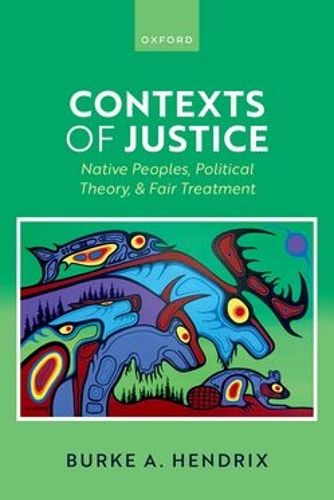Readings Newsletter
Become a Readings Member to make your shopping experience even easier.
Sign in or sign up for free!
You’re not far away from qualifying for FREE standard shipping within Australia
You’ve qualified for FREE standard shipping within Australia
The cart is loading…






Non-Indigenous citizens of the United States and Canada often argue that it is unfair for Indigenous peoples to have distinctive political and property rights within countries purportedly dedicated to equal treatment. Yet Indigenous nations in the United States and Canada have long made claims for a more contextually rich sense of fairness, and their legal and political successes in these efforts - difficult, uneven, and partial as they has been - have allowed them to continue to exist into the present. Their fairness arguments have thus found traction even in the face of longstanding political animosity.
Situated within debates on ideal and non-ideal theory, this book begins from arguments of this kind, and seeks to show why they are defensible within a contextually-rich theory of political fairness for Indigenous peoples in the United States and Canada. Structured to be accessible to political theorists and their students with little background in Indigenous politics, the book argues that this broader conception of fairness applies in relation to political sovereignty, ownership rights, cultural choices, and - uncomfortably - racially-inflected standards of tribal membership. Seeking to outline parameters for potential future political orders, it argues that such a contextually-rich standard of fairness is likely to be required long into the future as well, given the unavoidably variegated texture of human social order.
$9.00 standard shipping within Australia
FREE standard shipping within Australia for orders over $100.00
Express & International shipping calculated at checkout
Non-Indigenous citizens of the United States and Canada often argue that it is unfair for Indigenous peoples to have distinctive political and property rights within countries purportedly dedicated to equal treatment. Yet Indigenous nations in the United States and Canada have long made claims for a more contextually rich sense of fairness, and their legal and political successes in these efforts - difficult, uneven, and partial as they has been - have allowed them to continue to exist into the present. Their fairness arguments have thus found traction even in the face of longstanding political animosity.
Situated within debates on ideal and non-ideal theory, this book begins from arguments of this kind, and seeks to show why they are defensible within a contextually-rich theory of political fairness for Indigenous peoples in the United States and Canada. Structured to be accessible to political theorists and their students with little background in Indigenous politics, the book argues that this broader conception of fairness applies in relation to political sovereignty, ownership rights, cultural choices, and - uncomfortably - racially-inflected standards of tribal membership. Seeking to outline parameters for potential future political orders, it argues that such a contextually-rich standard of fairness is likely to be required long into the future as well, given the unavoidably variegated texture of human social order.